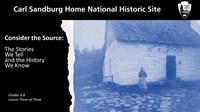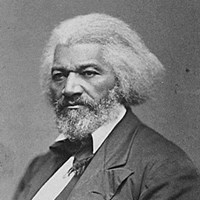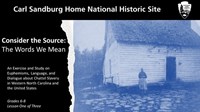- Lesson Plan (65)
- Field Trips (13)
- Distance Learning (11)
- Student Activities (10)
- Teacher Reference Materials (3)
- Guest Speakers (2)
- Primary Sources (2)
- Other Education Materials (1)
- Traveling Trunk (1)
- Carl Sandburg Home National Historic Site (5)
- Haleakalā National Park (5)
- New Orleans Jazz National Historical Park (5)
- Fort Necessity National Battlefield (4)
- Fort Scott National Historic Site (4)
- Catoctin Mountain Park (3)
- Gettysburg National Military Park (3)
- Acadia National Park (2)
- Andersonville National Historic Site (2)
- Show More ...
- Social Studies (65)
- Literacy and Language Arts (33)
- Science (33)
- Math (8)
Showing 99 results for critical thinking ...
Think Like a Bird
- Type: Student Activities
- Grade Levels: Upper Elementary: Third Grade through Fifth Grade
Students will understand the complexities of nest building by attempting to design and build a nest themselves.
- Type: Distance Learning
- Grade Levels: Upper Elementary: Third Grade through Fifth Grade
Critical Source Evaluation
- Type: Lesson Plan
- Grade Levels: High School: Ninth Grade through Twelfth Grade

National parks are valuable repositories of information including subject matter experts, photographs, and tangible objects. One of the founding principles of national parks is that this primary source information be preserved so that people may learn from it in the future. Students today may take advantage of this opportunity both in person and online.
Pickett's Charge: A Critical Look
- Type: Field Trips
- Grade Levels: Upper Elementary: Third Grade through Fifth Grade

Battle, as shown by "Pickett's Charge", was a sad, costly, and frightening experience during which soldiers exhibited many examples of courage, devotion, fighting ability and fear. The Pickett's Charge student education program seeks to personalize the battle by having each student focus on the life and sacrifice of one soldier. By role-playing the soldiers in one regiment involved in the infantry assault, it is hoped that the emotional context of battle is revealed.
Art Criticism and Mount Rushmore
- Type: Primary Sources ... Student Activities ... Teacher Reference Materials ... Other Education Materials
- Grade Levels: High School: Ninth Grade through Twelfth Grade
I Think I Know About Slavery... Pre-Visit Activity
- Type: Field Trips
- Grade Levels: Middle School: Sixth Grade through Eighth Grade

During the decades preceding the Civil War, when the United States struggled to define itself, no issue more divided and plagued its people than slavery. Even among those who had doubts about its morality, slavery was debated as part of a complex set of interlocking philosophical, social, economic, and political concerns too difficult to resolve and too intertwined with the fate of the nation to consider abolishing.
Artillery & Teamwork: The 9th Massachusetts Battery AND The Round Tops: A Critical Look
- Type: Field Trips
- Grade Levels: Middle School: Sixth Grade through Eighth Grade

Battlefield Footsteps is a program that focuses on character traits that can be learned from the Battle of Gettysburg. Teachers select one of three traits to focus on: leadership, courage, or determination. Students will then "walk in the footsteps" of one of three different units while discovering their roles and action in the battle. The units can be either the 9th Massachusetts Battery (Courage); the 15th Alabama (Determination); or 6th Wisconsin (Leadership)
The Forests, Wetlands, and Deserts of Zion
- Type: Distance Learning
- Grade Levels: Upper Elementary: Third Grade through Fifth Grade
Winter Track Mystery: SnowSchool Post-visit Activity
- Type: Lesson Plan
- Grade Levels: Upper Elementary: Third Grade through Fifth Grade
Consider the Source: The Stories We Tell and The History We Know (Grade 6 -8) Lesson 3 of 3 Carl Sandburg Home NHS
- Type: Lesson Plan
- Grade Levels: Middle School: Sixth Grade through Eighth Grade

This is the 3rd of 3 lessons designed to contribute to middle school student's working knowledge of Black history in Western North Carolina (W.N.C.) and to give them the skills to identify common myths of the region as well. This lesson introduces critical thinking concepts such as anachronisms and explores myths and deferred histories from W.N.C. This lesson is intended to exercise historical thinking skills and encourage the dialogue studied in previous lessons.
“Survival: Risky Business” Wildlife 4-6 Grade
- Type: Lesson Plan
- Grade Levels: Upper Elementary: Third Grade through Fifth Grade

Students will receive an endangered or extinct mystery animal card taped to their backs. They must use critical thinking skills to ask the right questions and discover the identity of their mystery animal. They will discuss what it means to be extinct or endangered and ways they can help those animals that are threatened with extinction.
Using the Film "Andersonville" in the Classroom
- Type: Teacher Reference Materials
- Grade Levels: High School: Ninth Grade through Twelfth Grade

Popular media, such as books and films, have long been used to teach the story of Andersonville. The 1996 film "Andersonville" continues to be a popular classroom tool. This material is intended to assist teachers in clearly identifying historical reality versus Hollywood illusion and aiding students to think critically about the portrayal of historic events.
Frederick Douglass, The Educator of Anacostia: “Once you learn to read, you will be forever free.”
- Type: Lesson Plan
- Grade Levels: Middle School: Sixth Grade through Eighth Grade

Students will learn about Frederick Douglass’s passion for learning and sharing knowledge with the African-American community. They will use 3D printed replicas to practice skills in primary source research, critical thinking, discussion, and writing. Este plan de clase con actividades incluido también está disponible en español.
A Day in the Life: A Virtual Fort Stanwix Field Trip
- Type: Distance Learning ... Field Trips ... Student Activities ... Guest Speakers
- Grade Levels: Upper Elementary: Third Grade through Fifth Grade

Join park volunteer Louisa on this virtual field trip of the fort. Learn more about the reasons why the fort was built, what a soldier's job was, and how their families helped support them. For teachers, there are critical thinking questions throughout for your class. Pause the video and have a discussion about the challenges of 18th Century life.
Carving the Canyon - The Geologic Story of Zion
- Type: Distance Learning
- Grade Levels: Upper Elementary: Third Grade through Fifth Grade

Trace the geologic history of earth through the stunning canyon walls of Zion National Park. This program introduces students to the unique and complex story of Zion and the southwest, and allows students to gain a deeper understanding of geologic processes. Students interact with park rangers to discuss the formation of this canyon, and then engage in a critical-thinking activity about erosion. (60 minutes)
The American Civil War: A Humanitarian Perspective
- Grade Levels: Middle School: Sixth Grade through Eighth Grade

Learning about humanitarian law helps students connect lessons of the past with the issues of the present. Students will explore historical events through the lives of those who experienced the American Civil War and will participate in hands-on exercises that make for challenging and exciting class projects and discussions. The lessons will also help students develop critical thinking skills and character.
Consider the Source: The Words We Mean: An Exercise and Study on Euphemisms, Language, and Dialogue about Chattel Slavery in Western North Carolina and the United States (Grades 6-8) Lesson 1 of 3 Carl Sandburg Home NHS
- Type: Lesson Plan
- Grade Levels: Middle School: Sixth Grade through Eighth Grade

This is the 1st of 3 lessons designed to contribute to middle school student's working knowledge of Black history in Western North Carolina. This lesson introduces students to the language of Black history and its relevance to their own dialogues and historical skills. With multiple interactive opportunities, and historical and artistic sources, students will develop language arts and critical thinking skills.
Bears of Glacier Bay 3: Be Bear Aware
- Type: Student Activities
- Grade Levels: Middle School: Sixth Grade through Eighth Grade

Students will become “bear aware” by exploring ways to reduce human-bear interactions and applying them to different real-life scenarios. They will use critical thinking skills to make a list of considerations when camping, hiking, fishing, and at home. Students will conclude by creating a “Bear Aware Campaign” by making posters, creating podcasts or videos, or writing news stories.






